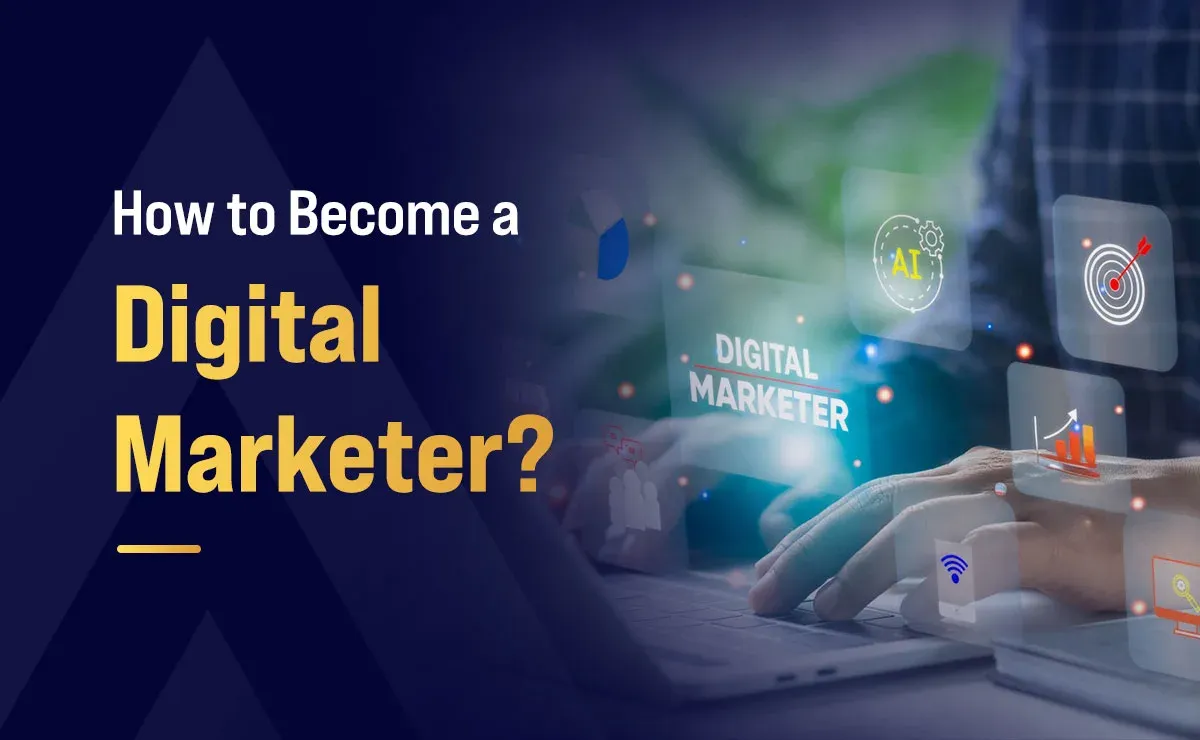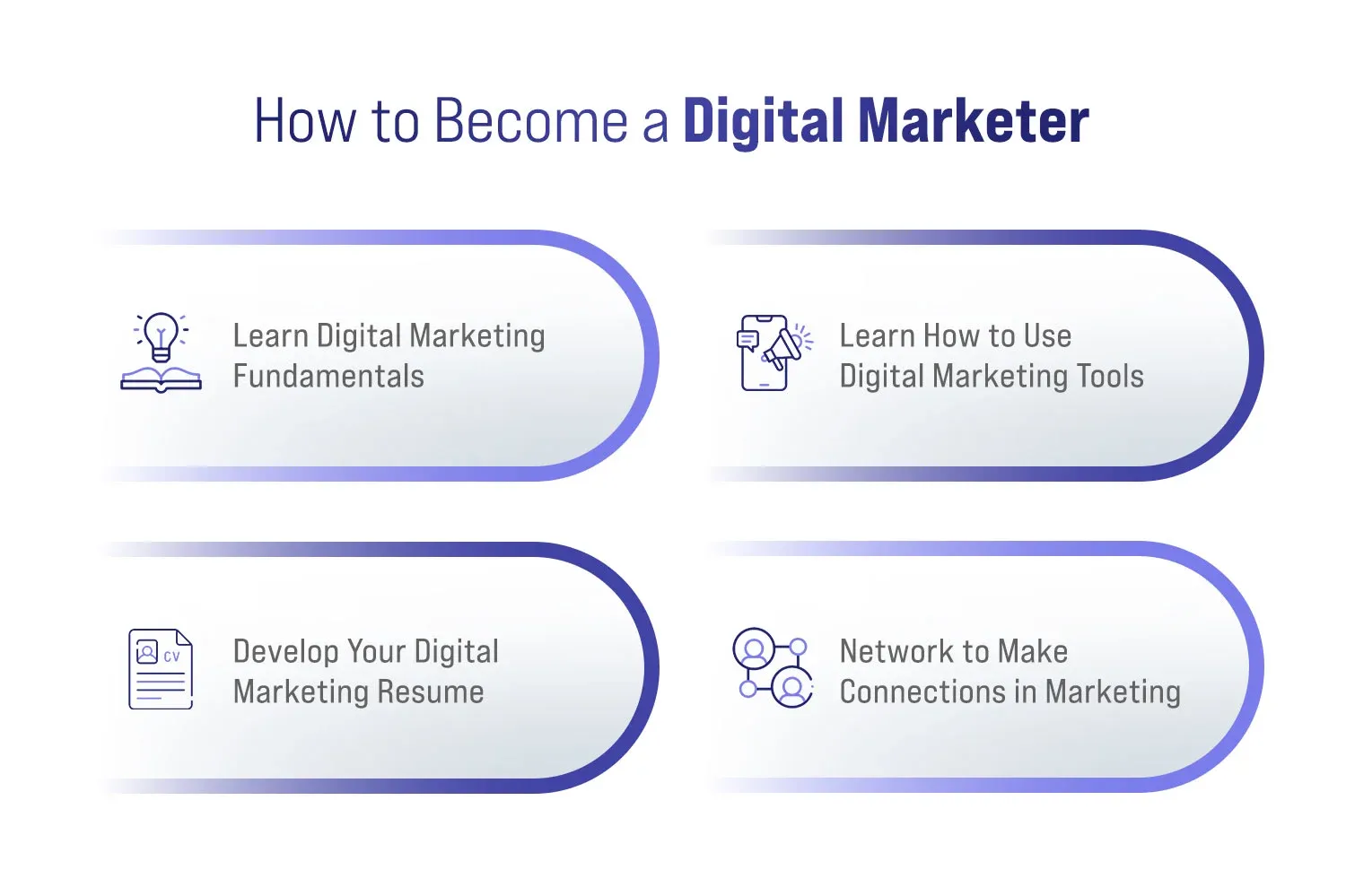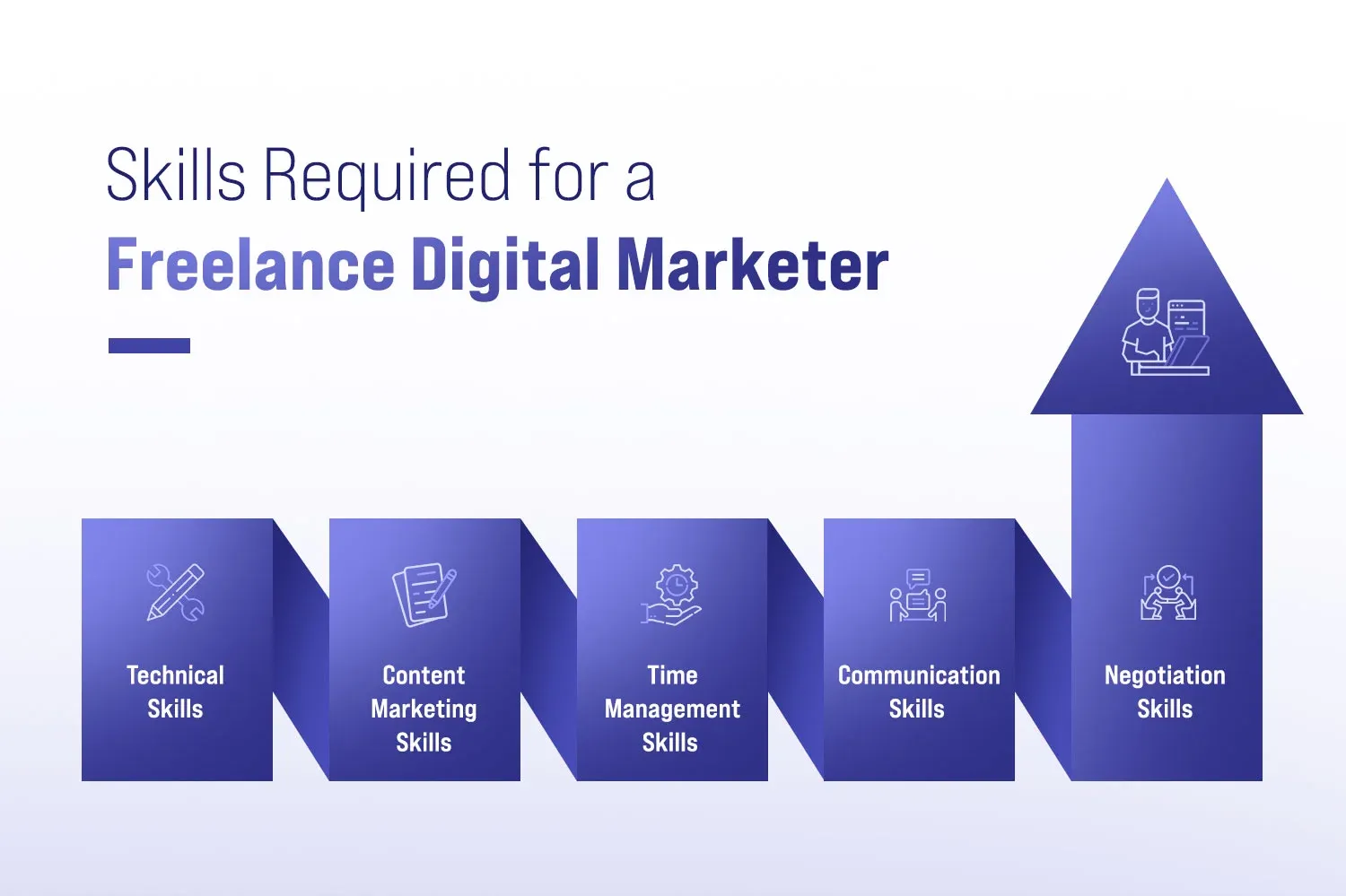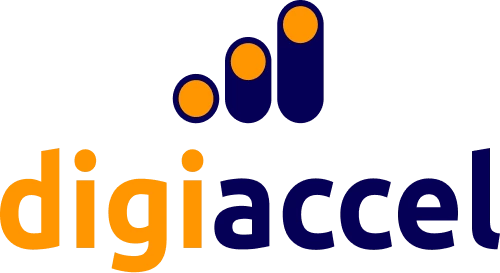How to Become a Digital Marketer?

In the modern era of business, digital marketing has transitioned from a “nice-to-have skill” to an absolute requirement for the functioning of any successful organization. It has rightfully grown into an ecosystem, opening doors to a world of creative, analytical, and strategic leadership opportunities for professionals. If you've ever been curious about diving into digital marketing as a beginner, this is the perfect starting point for you.
Whether you’re a student, an aspiring freelancer, or someone who is transitioning into this career, the road to becoming a digital marketer is now more accessible than ever. This article will walk you through how to become a digital marketer in five practical steps while also addressing career paths, demand, freelancing potential, and frequently asked questions.
How to Become a Digital Marketer?
Breaking into the world of digital marketing may seem overwhelming at first, but with the right guidance, anyone can successfully launch a career in this fast-paced and rewarding industry. Follow these five essential steps to begin your journey toward becoming a skilled and confident digital marketer:

Learn Digital Marketing Fundamentals
Every great digital marketer begins with a strong foundation. Digital marketing is an umbrella term covering several disciplines, including SEO (search engine optimization), social media marketing, content strategy, email marketing, UX (user experience) design, and PPC (pay-per-click) advertising.
To start, aspiring marketers should familiarize themselves with core marketing concepts such as:
- The marketing funnel: It illustrates the customer journey, typically divided into three key stages: awareness, where potential customers first learn about a product or service; consideration, where they actively research and evaluate their options; and conversion, where they make a purchase or take a desired action.
- Customer personas and behavior: These are crafted, data-backed profiles that embody your ideal audience, blending research with strategic imagination. Analyzing customer behavior involves studying how these individuals interact with your brand, their motivations, and their decision-making processes.
- Inbound and Outbound Marketing: Inbound pulls customers in with engaging, relevant content—think SEO, blogs, and social media. Outbound pushes your message outward via ads, cold outreach, and traditional promotions.
- Marketing Metrics (CTR, Bounce rates, ROI): The click-through rate (CTR) quantifies engagement by measuring the proportion of users who click a link relative to total impressions. Bounce rate indicates the percentage of visitors who exit a site without interaction, serving as a critical performance indicator. ROI (return on investment) is a critical metric that calculates the profitability of a marketing campaign by comparing the net profit to the total investment.
You can gain this foundational knowledge through online courses, bootcamps, or free resources, many of which allow you to start from scratch and work at your own pace.
Learn How to Use Digital Marketing Tools
Digital marketing thrives where creativity meets cutting-edge tech—balancing art and algorithms. The right tools not only streamline marketing tasks but also increase their competency and enable them to understand their audience and refine campaigns.
Some essential tools every digital marketer should master include:
- Google Analytics: It is an indispensable tool for understanding your website's performance by providing data on traffic sources and how users interact with your content.
- Google Ads: It is a powerful platform for running pay-per-click (PPC) and display advertising campaigns to reach targeted audiences.
- Meta Business Suite: This integrated platform enables centralized management of cross-channel marketing campaigns across Facebook and Instagram, optimizing workflow efficiency.
- SEMrush and Ahrefs: These are leading SEO research tools that enable you to analyze your website's ranking, conduct keyword research, and gain insights into your competitors' strategies.
- Mailchimp or HubSpot: They are essential for automating your email marketing campaigns, nurturing leads, and building customer relationships.
- Canva and Adobe Creative Suite: These offer the necessary tools for creating visually appealing graphics and engaging content for your marketing materials.
Learning these tools makes your resume more competitive and helps you demonstrate hands-on expertise—especially if you're working on how to start digital marketing from home.
Build a Portfolio of Digital Marketing Projects
As with any creative or technical field, a portfolio is one of your most powerful assets. It allows you to showcase your skills and document real-world results from the campaigns you’ve created or contributed to.
Even if you're new to the field, you can build a compelling portfolio by:
- Volunteering for a local business, which provides you with real-world experience in applying marketing skills and showcasing tangible results for a client.
- Creating mock digital campaigns that demonstrate your strategic thinking and creative abilities.
- Running your own blog or social media channel, which will serve as a live portfolio showcasing your content creation skills and your ability to build and engage an audience.
- Freelancing on small gigs, which offers the opportunity to work with real clients, gain practical experience, and build a collection of successful projects.
This approach not only validates your competencies but also demonstrates proactive problem-solving abilities and self-directed initiative.
Develop Your Digital Marketing Resume
To stand out, your resume should reflect a blend of soft skills, technical proficiency, and relevant projects.
You can include:
- Certifications from reputable platforms like Google Ads, HubSpot, and Hootsuite. Earning certifications signals dedication to growth and proves expertise in niche marketing areas as well as proficiency and familiarity with industry-standard software.
- Key soft skills such as communication, project management, and adaptability. This proves you possess the interpersonal and organizational abilities crucial for success in a collaborative marketing environment.
Tailor your resume to the job description, especially if you’re trying to demonstrate how to become a digital marketer without a degree. Experience and results often speak louder than academic qualifications.
Network to Make Connections in Marketing
Networking is one of the most underestimated but crucial steps in becoming a digital marketer. Networking unlocks hidden job markets—many roles are filled through referrals and industry circles.
Here’s how you can build your network:
- By attending virtual marketing meetups or webinars, you get to connect with peers, learn from experts, and expand your professional circle.
- By joining LinkedIn groups related to marketing, you allow yourself to participate in industry discussions, ask questions, and connect with other marketers.
- By following and engaging with marketing leaders on social media, you keep yourself informed about the latest trends and get chances to interact with influential figures in the field.
- Leveraging informational interviews let you tap into insider knowledge, build mentorships, and expand your professional network strategically.
- Sharing your own content and insights online helps establish you as a knowledgeable resource and attracts other professionals to your network.
Networking not only helps you find job opportunities but also keeps you informed on marketing trends, industry tools, and job expectations.
Is Digital Marketing in Demand?
It is quite evident that digital marketing skills are not only in demand, but it’s also one of the fastest-growing career fields in today’s economy. With the global digital marketing market projected to grow at a compound annual growth rate (CAGR) of 30.20%, reaching a value of USD 72.10 billion by 2034, it’s clear that businesses are investing heavily in online strategies to stay competitive and relevant.
Nearly 6 billion internet users worldwide will undoubtedly contribute to this digital shift by 2027. Hence, it makes sense that businesses across every sector are demanding skilled digital marketers to leverage the search engine and its various components like social media, email, content, and paid advertising effectively.
Platforms like LinkedIn consistently rank “Digital Marketing Specialist” among the top 10 most in-demand job titles, with over 860,000 job openings currently listed. But unfortunately, the industry is facing a massive digital skill and talent shortage. It means that there are more jobs than qualified individuals to fill them, making now an ideal time to enter the field with the right skills and expertise.
Who is a Freelance Digital Marketer?
A freelance digital marketer operates independently, delivering customized online strategies to diverse clients, with no corporate strings attached. Instead of working full-time for one organization, freelancers collaborate with various clients ranging from startups to well-established companies, delivering customized solutions across digital platforms.
These professionals bring agility and creativity to the table, often juggling multiple roles such as SEO strategist, content creator, and ad campaign manager. Because they work with diverse brands and industries, freelance marketers tend to offer fresh, out-of-the-box thinking and up-to-date insights that can give your business a competitive edge.
Key Responsibilities of a Freelance Digital Marketer
Freelance digital marketers wear many hats, each one vital to your brand’s online success. Here are some of their most common responsibilities:
- Designing Custom Marketing Strategies: Every business is different, and so are its goals. Freelancers begin by assessing your unique needs, whether that’s growing organic traffic, improving conversions, or building a strong social media presence. They then develop customized strategies designed to achieve your specific business goals while resonating with your intended demographic.
- Optimizing for Search Engines (SEO): Visibility is everything in the digital world. Freelancers conduct keyword research, optimize web pages, and implement link-building tactics to improve your website’s ranking on search engines. This boosts discoverability and drives qualified traffic to your site.
- Managing Pay-Per-Click (PPC) Campaigns: When instant visibility is key, PPC delivers fast-tracked results through targeted ads. Freelancers can plan, launch, and optimize ads across platforms like Google Ads or Facebook, ensuring your ad spend translates into tangible results.
- Handling Social Media Marketing: From writing captions to designing graphics and responding to comments, freelancers manage your social media accounts to keep your brand top-of-mind. They know how to build engagement and grow your audience through consistent, creative content.
- Creating and Promoting Content: Good content builds trust. Freelance digital marketers create blogs, email campaigns, landing pages, and other content designed to inform, persuade, and convert. They also ensure all content is SEO-friendly to maximize reach.
- Analyzing Performance: To understand what’s working (and what’s not), freelancers track campaign performance using tools like Google Analytics or SEMrush. They provide clear reports with actionable insights, helping you refine your marketing efforts over time.
Why Work with a Freelance Digital Marketer?
Hiring a freelance digital marketer can be a smart move, especially for small to mid-sized businesses looking to grow without the overhead costs of a full-time team. Here’s why:
- Cost-Effective: The freelance model provides access to specialized expertise without the financial commitments associated with permanent staffing, such as benefits or infrastructure costs. This makes freelancers a budget-friendly option, especially for startups or project-based campaigns.
- Niche Expertise: Many freelancers focus on specific areas like SEO, email marketing, or content strategy, bringing in-depth knowledge that can drive better outcomes. This specialized focus often results in higher-quality work compared to generalists.
- Flexibility and Scalability: Whether you need help for a short-term launch or a long-term partnership, freelancers offer the flexibility to scale your marketing efforts up or down depending on your goals and budget.
- Innovative Ideas: Because they work across industries and audiences, freelance digital marketers bring fresh perspectives and creative problem-solving to your brand strategy, often seeing angles that internal teams may overlook.
Skills Required for a Freelance Digital Marketer
Being a successful freelancer means you're not only executing marketing strategies but also managing your own mini enterprise. This needs a dynamic mix of technical know-how, content expertise, and soft skills to deliver results, maintain client relationships, and stand out in a competitive field.
Let’s break down the essential skills every freelance digital marketer should possess:

Technical Skills
At the heart of digital marketing is technology. A proficient freelance digital marketer must be fluent in tools and techniques that drive visibility, engagement, and conversions.
- SEO & SEM: Mastering search dominance via SEO (keywords, backlinks, optimization) and SEM (strategic ad buys) is non-negotiable for visibility.
- Analytics: Whether using Google Analytics, SEMrush, or other platforms, freelance digital marketers must be able to track traffic, measure campaign performance, and extract actionable insights.
- Conversion Rate Optimization (CRO): Traffic means little without turning visitors into buyers, hence optimizing initiatives accordingly is the game-changer. Technical skills in A/B testing, funnel optimization, and user behavior analysis are highly valuable in CRO.
- Ad Platforms: Familiarity with running paid campaigns on Google Ads, Facebook Ads, and LinkedIn Ads is a game-changer, especially when clients expect quick ROI.
- Marketing Automation Tools: Experience with tools like Mailchimp and HubSpot helps streamline email marketing and lead nurturing tasks.
Content Marketing Skills
Whether written, visual, or audio-based, content is key in marketing and needs to be strategic, engaging, and aligned with brand goals.
- Written Content Creation: Blogs, social media posts, landing page copy, and email newsletters must be informative, persuasive, and SEO-optimized.
- Video and Audio: Many freelance digital marketers branch into video scripts, YouTube content, or even podcast creation—whatever best engages the target audience.
- Strategic Storytelling: Great content isn't just well-written—it tells a story, evokes emotion, and guides the user toward action.
Effective content marketing helps freelancers build trust for their clients' brands, improve SEO, and drive sustained traffic.
Time Management Skills
Managing concurrent projects with competing deadlines represents one of the most significant operational challenges for freelance marketing professionals. That’s why time management is a make-or-break skill.
- Task Prioritization: Successful freelancers rank tasks by urgency, value, and deadlines—mastering this is key.
- Scheduling: Tools like Trello or Google Calendar turn chaos into order, keeping deliverables on track.
- Multitasking: Managing emails, invoices, edits, and campaigns simultaneously demands strong multitasking abilities.
By managing time effectively, freelancers can avoid burnout, deliver high-quality work, and maintain a healthy work-life balance—especially relevant for those figuring out how to start digital marketing from home.
Communication Skills
Freelancers often work remotely, which makes clear communication more important than ever.
- Client Communication: Freelancers should be able to discuss ideas, pitch strategies, and explain campaign results in a way that’s easy to understand—even for non-marketing clients.
- Reporting: Regular updates, performance dashboards, and detailed reports build transparency and trust.
- Collaborative Tools: Familiarity with tools like Slack, Zoom, and Google Workspace ensures seamless interaction with clients and teams.
Clear communication aligns your vision with client goals and missteps here derail even the best campaigns.
Negotiation Skills
Negotiation goes beyond pricing; it’s about showcasing your value.
- Freelance digital marketers should know how to present their services, justify rates, and set boundaries clearly and confidently.
- A good freelancer analyzes industry standards and understands what other professionals charge, ensuring competitive yet fair pricing.
These negotiation abilities are especially useful when working with clients who are comparing multiple proposals or have tight budgets.
FAQ’s
Q1. How to become a digital marketer after 12th?
Ans: Embarking on a digital marketing career post-12th grade is achievable by establishing core marketing knowledge and cultivating practical, in-demand technical skills. Begin by enrolling in online digital marketing courses (many are beginner-friendly and even free).
Dive into SEO, social media, content, and analytics. Practice by running a blog, handling a brand’s social account, or assisting local businesses pro bono. With consistency, a good portfolio, and certifications, you can start applying for internships or freelance gigs, even while pursuing further education or working part-time.
Q2. How to become a digital marketer with no experience?
Ans: If you are wondering how to start digital marketing for beginners, the best way to break into this field is through hands-on learning and personal projects. Start by mastering the fundamentals through tutorials, courses, or bootcamps. Build credibility by creating a personal website or curating social media profiles that highlight your skills.
You can also offer your services to small businesses or non-profits to gain practical experience. Building a portfolio that showcases real results is more valuable than a traditional resume alone. Over time, your projects, self-initiated work, and certifications will speak for your capabilities, helping you land your first paid opportunity.
Q3. How to become a digital marketer without a degree?
Ans: The industry values skills, creativity, and results more than formal education. Launch self-education via Coursera, Google Digital Garage, or HubSpot. Get certified, work on mock or real projects, and curate a standout portfolio.
Prioritize mastering industry-standard platforms including Google Analytics, search engine optimization tools, and social media advertising dashboards to establish technical proficiency. Networking with professionals through LinkedIn or marketing communities can also open doors to freelance or full-time opportunities. In digital marketing, your portfolio and problem-solving ability can outweigh traditional qualifications.
Summing Up
Digital marketing has outgrown being an optional skill to become an absolute necessity. It opens career gateways packed with opportunities for those ready to adapt, learn, and create impact in the digital world. Whether you’re fresh out of school, changing careers, or starting without any experience or degree, the path to becoming a digital marketer is wide open and more accessible than ever.
By mastering the fundamentals, building your portfolio, learning the tools of the trade, and networking strategically, you can carve a successful career in this dynamic and fast-growing industry. The digital world rewards action-oriented people, so start small, stay consistent, and let your work speak louder than ever.

